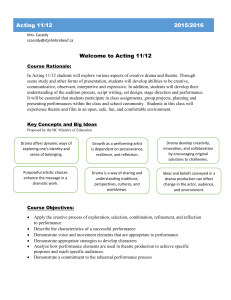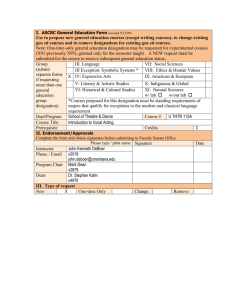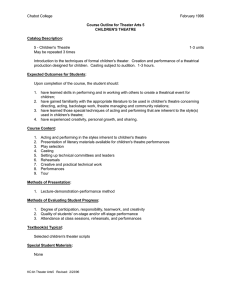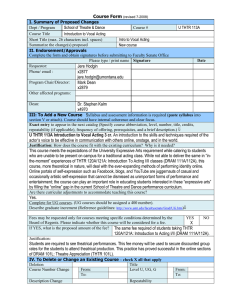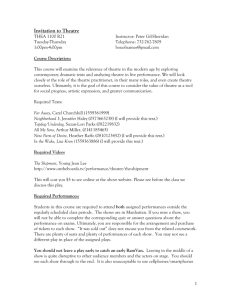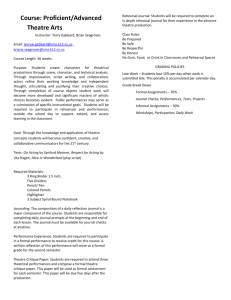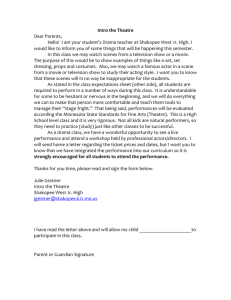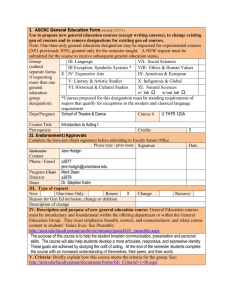Introduction to Acting – THTR 120A – 90 - 3... McGill 125, MTWRF 9:00 AM – 12:00 PM
advertisement
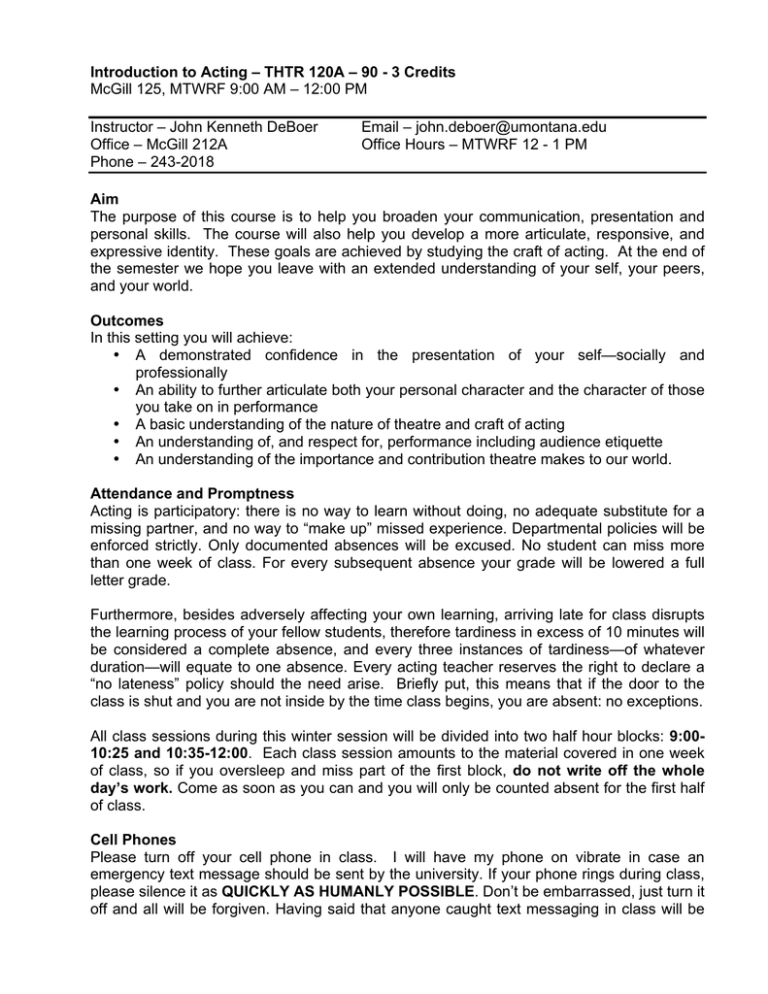
Introduction to Acting – THTR 120A – 90 - 3 Credits McGill 125, MTWRF 9:00 AM – 12:00 PM Instructor – John Kenneth DeBoer Office – McGill 212A Phone – 243-2018 Email – john.deboer@umontana.edu Office Hours – MTWRF 12 - 1 PM Aim The purpose of this course is to help you broaden your communication, presentation and personal skills. The course will also help you develop a more articulate, responsive, and expressive identity. These goals are achieved by studying the craft of acting. At the end of the semester we hope you leave with an extended understanding of your self, your peers, and your world. Outcomes In this setting you will achieve: • A demonstrated confidence in the presentation of your self—socially and professionally • An ability to further articulate both your personal character and the character of those you take on in performance • A basic understanding of the nature of theatre and craft of acting • An understanding of, and respect for, performance including audience etiquette • An understanding of the importance and contribution theatre makes to our world. Attendance and Promptness Acting is participatory: there is no way to learn without doing, no adequate substitute for a missing partner, and no way to “make up” missed experience. Departmental policies will be enforced strictly. Only documented absences will be excused. No student can miss more than one week of class. For every subsequent absence your grade will be lowered a full letter grade. Furthermore, besides adversely affecting your own learning, arriving late for class disrupts the learning process of your fellow students, therefore tardiness in excess of 10 minutes will be considered a complete absence, and every three instances of tardiness—of whatever duration—will equate to one absence. Every acting teacher reserves the right to declare a “no lateness” policy should the need arise. Briefly put, this means that if the door to the class is shut and you are not inside by the time class begins, you are absent: no exceptions. All class sessions during this winter session will be divided into two half hour blocks: 9:0010:25 and 10:35-12:00. Each class session amounts to the material covered in one week of class, so if you oversleep and miss part of the first block, do not write off the whole day’s work. Come as soon as you can and you will only be counted absent for the first half of class. Cell Phones Please turn off your cell phone in class. I will have my phone on vibrate in case an emergency text message should be sent by the university. If your phone rings during class, please silence it as QUICKLY AS HUMANLY POSSIBLE. Don’t be embarrassed, just turn it off and all will be forgiven. Having said that anyone caught text messaging in class will be 2 DRAM 111A, Winter 2010, DeBoer immediately dismissed from class, resulting in a complete absence for the day. I’M NOT KIDDING. Evaluation Attendance including promptness Participation and Evaluation in all projects and performances Writing Assignments Effort/respect/attitude 25% 25% 30% 20% Production Attendance As this a winter session course, you will not be able to view and write about the performances in the upcoming spring semester. We will view several taped performances in class and writing assignments on those performances will substitute for this component of your grade. The class fee that you have paid allows you to get one ticket for the Spring shows at no extra expense. You may pick up your ticket at the Drama box office located in the lobby of the PARTV building in person between 11:30 AM and 5:30 PM, Monday – Friday after the start of the Spring 2010 semester. You must present your GRIZ CARD to pick up your tickets and you must identify which class you are in, therefore you must know your section number and instructors name. You are in section: 90 Your instructor’s name is: John Kenneth DeBoer Seating in the Masquer Theatre is general admission. Seating in the Montana Theatre is reserved. The fee that you have paid does not guarantee you a ticket on a particular night, nor does it guarantee that you will be able to get a ticket if the show sells out, therefore do not wait until the evening of the performance to pick up a ticket. Participation in Class Projects and Performances You will be performing on a weekly basis and will be given grades for your class work and performances in the areas of process and product. In other words you will be graded on the finished performance and on all of the rehearsals. Your grade in this area is not based on the natural talent you bring to the class; rather it will be a reflection of your developed talent and the progress that you make over the course of the semester. Extra Credit Making the choice to live a life in the theatre requires service to community by volunteering and making donations of time and goods. This semester you can earn up to a maximum of fifty extra-credit points towards your participation grade for participating in a wide variety of activities. They are as follows: • 10 Points - Attend performances sponsored by Montana Rep Missoula, Montana Actors Theatre, the Spring Dance Concert, the Sunday Night Lights reading series, and other local performances with instructor approval. Must provide a program from the event with your name written clearly on the front in order to be awarded the points • 5 Points Each – Donate Sparkling Cider, or a sleeve of fancy 8-ounce clear plastic party cups for opening night toasts of the The Lion in Winter, Crazy For you, Fuddy Meers, and the Spring Dance Concert. Last Modified December 2, 2010 DRAM 111A, Winter 2010, DeBoer 3 In order to receive credit for seeing a production you must present a ticket stub or a program with your name written clearly at the top. Cups and Cider should be brought to me during my office hours. If you participate on a crew, please provide me the company and director’s name and I will contact them to confirm your work. Effort/Respect/Attitude Effort and respect are two very important requirements. It is expected that you will respond to all assignments and performances with effort and enthusiasm. It is expected that you respect yourself, your classmates, your instructor, and your classroom environment. An excellent performance hinges upon taking risks, which is impossible to do if the environment is uncomfortable or uninviting. It is expected that when you participate in classroom activities your peers will encourage you to commit to your actions and characters without embarrassment, remorse, or caution. Passing this class requires openness and a willingness to take risks. Tentative Schedule This course is divided into sequential units. Unit 1: What is Theatre? What is Acting? The history and theory of theatre and acting, vocabulary, audience etiquette and devising new performances. Unit 2 The application of acting in your life: How empathy, tactic, objective, and influence relate in the world and on the stage. Unit 3: Ensemble: Building trust and skill through group exercises including warmups and theatre games. Unit 4: Exploration, Play, and Spontaneity: Improvisation and working with music and movement to learn to trust impulses and instincts. Unit 5: Solo Performance: Monologues, personal performances and solo character studies. Unit 6: Scene Work with a Partner: Rehearsing and performing short scenes with a partner, creating new and original characters, writing scenes, and script analysis. Writing Assignments There are four major writing assignments this semester. • • • • Devising, writing, and creating Theatre for Social Change (Group Project) Monologue Empathy Analysis Sweeney Todd Acting Critique Influence in Action Essays and Worksheets Although these assignments are generally reflective and creative in nature, they must be representative of university writing. You will be graded for your imagination and creativity as well as for the quality of your writing. These papers must be typed and proofread and must Last Modified December 2, 2010 4 DRAM 111A, Winter 2010, DeBoer meet the demands of the assignment. Details on these individual writing assignments will come as they are assigned. All written work must be MLA format, typed, and STAPLED. I will not accept it otherwise. No email submissions accepted. Print it the night before. Procedure/Policy You are expected to abide by the following departmental regulations. There is no eating, drinking, or gum chewing during the class. Please let me know if in writing if you have a medical exception to this policy. Water in a capped container is acceptable. Absolutely no weapons, real or fake, are allowed in the classroom. Late work is not accepted; this includes late or unprepared performances. Students are encouraged to wear appropriate movement attire to class. There is inherent risk involved in many Drama/Dance classes, as they are very physical in nature. Please proceed through class, shop time, or rehearsal with caution. Always be mindful of your personal safety and the safety of others. Students participating in class/shop/rehearsal/performance do so at their own risk. Departmental Handbook All Drama/Dance students must have an in-depth knowledge of the practices and procedures outlined in the Department of Drama/Dance Handbook. The Handbook is available online at http://www.sfa.umt.edu/drama/index.html. Academic Misconduct and the Student Conduct Code All students must practice academic honesty. Academic misconduct is subject to an academic penalty by the course instructor and/or disciplinary sanction by the University. All students need to be familiar with the Student Conduct Code. The Code is available for review online at www.umt.edu/SA/VPSA/Index.cfm/page/1321. Last Modified December 2, 2010 DRAM 111A, Winter 2010, DeBoer 5 I, ___________________________, understand that the preceding syllabus for the Winter Session 2010 section of Acting for Non-Majors stands as the course contract between the instructor, John Kenneth DeBoer, and myself and agree to abide by the expectations laid out. ____________________ _ ______ Signature _______ ____________________ Date Last Modified December 2, 2010 6 DRAM 111A, Winter 2010, DeBoer STUDENT DATA SHEET Name: Hometown: Phone: Email Address: Hobbies: Life Goal: Where have you lived besides your hometown for a significant amount of time? Do you have any medical problems you wish to tell me about that may be an issue during class? Any prior theatre or acting experience? Draw me a picture. Seriously. Anything you like. Last Modified December 2, 2010
